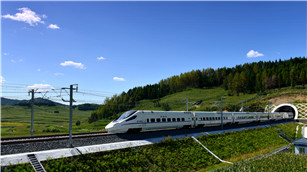Jilin: the gateway and pass to Northeast Asia
By Zhong Nan And Liu Mingtai
( China Daily )
2015-09-25
The future of Northeast Asia will be decided by regional connectivity, closer trade ties and cultural exchange - the three main reasons why Jilin province has made the decision to invest in more transport links with other economies in the region.
Jiang Chaoliang, the governor of the province, said more air, sea and rail links are being planned with neighboring countries, which will help put Jilin on a firmer economic footing.
Already, officials are preparing to launch international freight-train services from Changchun, the provincial capital, to Ulaanbaatar in Mongolia and major Russian cities over the next three years.
"Air cargo services from Changchun Longjia International Airport to major cities in Russia, Mongolia and Japan will be available soon to ship high-end and high-tech products between consumers and manufacturers on both sides," Jiang said.
Jilin is particularly well-positioned geographically to develop a modern logistics industry, with 16 China-Russia and China-Democratic People's Republic of Korea border ports, two international airports and two inland railway ports.
The village of Fangchuan in Hunchun, in the east of the province, for instance, is just 15 kilometers from the Sea of Japan. The mouth of the Tumen River, which feeds into the sea, is the closest point between China and Russia, the east coast of the Korean Peninsula, Japan and the DPRK.
Wang Shouchen, deputy director of the Jilin Provincial People's Congress, said officials are also planning to work with selected ports in Russia and the DPRK to develop shorter maritime routes to ship goods to Europe via the Northeast Passage in the Arctic Ocean.
Specially designed cargo ships carrying Chinese goods will leave Russia's Zarubino Harbor or Rajin Port in the DPRK on a 30-day journey to Europe via the passage - a route which could cut shipping times between Northeast Asia and European ports by a third.
With its mature equipment-manufacturing industry and strong levels of technical expertise, Jilin is considered one of China's major industrial bases with the automobile sector its pillar industry.
Changchun-based First Automotive Works Group sold 3.08 million vehicles last year, accounting for 13.1 percent of China's total auto sales.
Official data shows that Jilin's foreign trade rose by 2.1 percent on an annual basis in 2014, while foreign direct investment into the province also increased by 13.1 percent.
The province has already developed more than 10 large logistics parks, including the Changchun Xinglong Free Trade Zone.
Manufacturers, warehouse developers and delivery companies, including Zhejiang Transfar Co, Global Logistic Properties and SF Express Co, have built facilities in the zone.
Cai Jin, vice-president of the Beijing-based China Federation of Logistics and Purchasing, said with the accelerated reform of State-owned enterprises, a readjustment in industrial structures and service-trade upgrades, foreign trade volume in Jilin and the entire Northeastern region is projected to grow steadily in the second half of the year.
"Even though building a logistics network within the Northeast Asian region has been helpful to improve Jilin's economy, logistics and e-commerce companies across China should be aware that they have to focus overwhelmingly on expanding their export channels," Cai said.
"It would also prove profitable to establish more overseas logistics facilities and sorting centers in countries such as the Republic of Korea, Japan, Singapore and the United States, from which to operate export businesses to China, while the market still has less competition and demand is fairly high."




